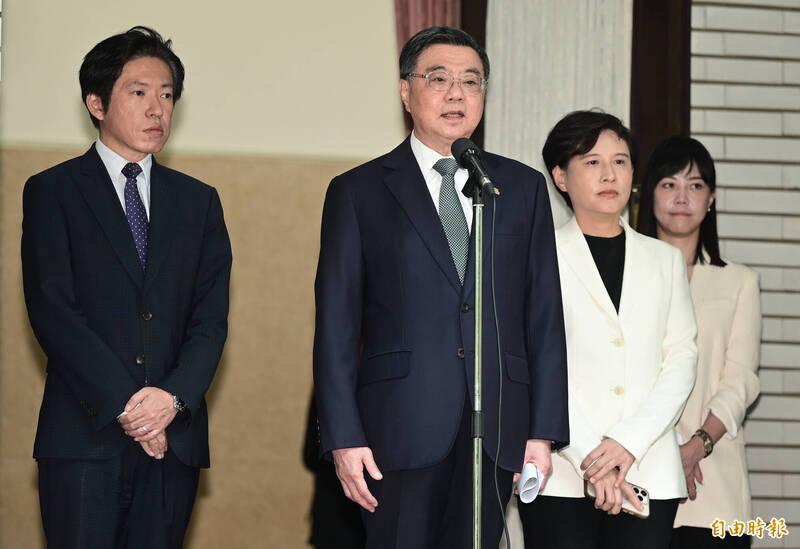The Executive Yuan said yesterday that it would propose its own amendment to the fiscal revenue act, adding to controversy over the act’s revision as lawmakers from both ruling and opposition parties have proposed amendments.
Amendments to the Act Governing the Allocation of Government Revenues and Expenditures (財政收支劃分法) have sparked debate over allocating more tax revenue to local governments.

Photo: Wang Yi-sung, Taipei Times
Premier Cho Jung-tai (卓榮泰) said today that the Executive Yuan hopes to discuss the matter with local governments based on a model where vertical powers are divided and financial resources are balanced.
While local governments would receive a larger share of tax revenue, they would need to take on more responsibilities for self-governance, Cho said, emphasizing that this is how the fiscal revenue act can be sustainable in the long term.
After consulting with local governments, the Executive Yuan would propose a complete version of the amendment and strive to incorporate reasonable suggestions from legislators, he said.
Speaking to the media before a meeting with the Legislative Yuan today, Cho said that the Executive Yuan intends to propose a version of the act that ensures long-term stability.
The Cabinet has taken into consideration the views of fiscal experts and lawmakers across party lines, he said.
The main challenge now is addressing errors raised during the Executive Yuan’s review of next year’s fiscal planning bill, he added.
In addition, opposition parties were dissatisfied that the central government’s 2026 general budget did not allocate funds to improve military pay and police and firefighter pensions, and have requested a reconsideration of the budget bill, demanding that it be sent back to the Procedure Committee.
In response, Cho reiterated today that if the Constitutional Court rules the measure constitutional, the funds would be allocated and could be applied retroactively.
However, if it is deemed unconstitutional then it cannot be budgeted, he said.
He added that he hopes the legislature has sufficient time to thoroughly review the general budget bill.
With the Legislative Yuan currently conducting its general policy inquiry, it might not have enough time to handle the general budget, he said.
Cho also said he wanted to discuss the matter with Legislative Yuan Speaker Han Kuo-yu (韓國瑜) and all party caucuses so that they do not repeat this year’s mistakes.
Next year, the Executive Yuan would be implementing a wide range of central government policies, including numerous public welfare initiatives, youth programs and AI-related projects, all of which require central and local government cooperation, he said.
Many local subsidies, whether for infrastructure projects or social welfare programs, depend on the Legislative Yuan’s prompt review and approval of the central government’s general budget for next year, he added.

The first global hotel Keys Selection by the Michelin Guide includes four hotels in Taiwan, Michelin announced yesterday. All four received the “Michelin One Key,” indicating guests are to experience a “very special stay” at any of the locations as the establishments are “a true gem with personality. Service always goes the extra mile, and the hotel provides much more than others in its price range.” Of the four hotels, three are located in Taipei and one in Taichung. In Taipei, the One Key accolades were awarded to the Capella Taipei, Kimpton Da An Taipei and Mandarin Oriental Taipei. Capella Taipei was described by

The Taichung District Court yesterday confirmed its final ruling that the marriage between teenage heir Lai (賴) and a man surnamed Hsia (夏) was legally invalid, preventing Hsia from inheriting Lai’s NT$500 million (US$16.37 million) estate. The court confirmed that Hsia chose not to appeal the civil judgement after the court handed down its ruling in June, making the decision final. In the June ruling, the court said that Lai, 18, and Hsia, 26, showed “no mutual admiration before the marriage” and that their interactions were “distant and unfamiliar.” The judge concluded that the couple lacked the “true intention of

EVA Airways today confirmed the death of a flight attendant on Saturday upon their return to Taiwan and said an internal investigation has been launched, as criticism mounted over a social media post accusing the airline of failing to offer sufficient employee protections. According to the post, the flight attendant complained of feeling sick on board a flight, but was unable to take sick leave or access medical care. The crew member allegedly did not receive assistance from the chief purser, who failed to heed their requests for medical attention or call an ambulance once the flight landed, the post said. As sick

INDUSTRY: Beijing’s latest export measures go beyond targeting the US and would likely affect any country that uses Chinese rare earths or related tech, an academic said Taiwanese industries could face significant disruption from China’s newly tightened export controls on rare earth elements, as much of Taiwan’s supply indirectly depends on Chinese materials processed in Japan, a local expert said yesterday. Kristy Hsu (徐遵慈), director of the Taiwan ASEAN Studies Center at the Chung-Hua Institution for Economic Research, said that China’s latest export measures go far beyond targeting the US and would likely affect any country that uses Chinese rare earths or related technologies. With Japan and Southeast Asian countries among those expected to be hit, Taiwan could feel the impact through its reliance on Japanese-made semi-finished products and